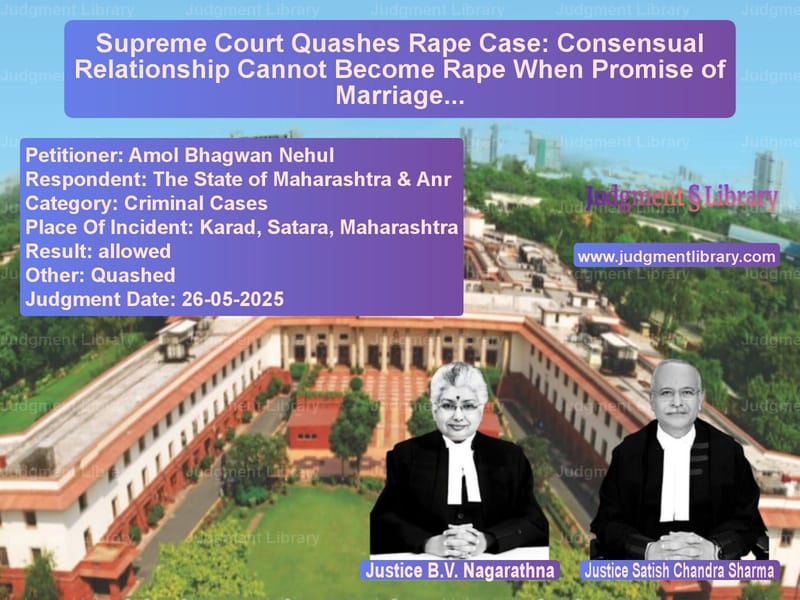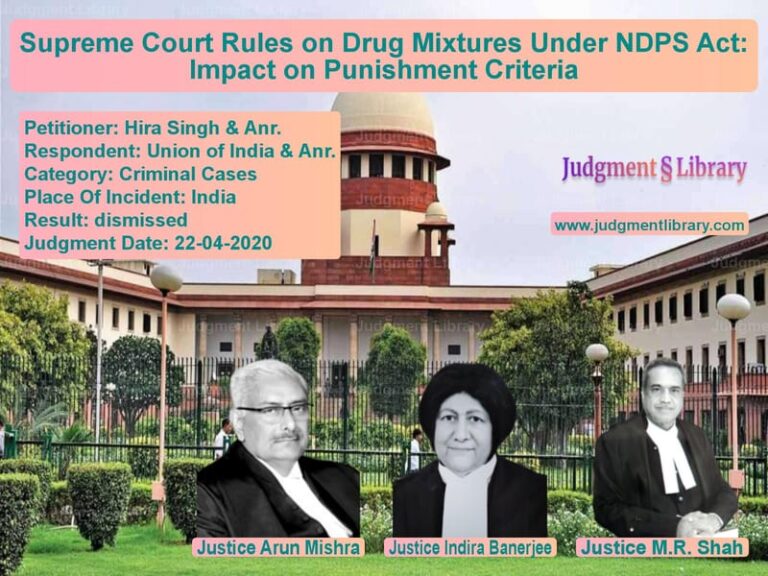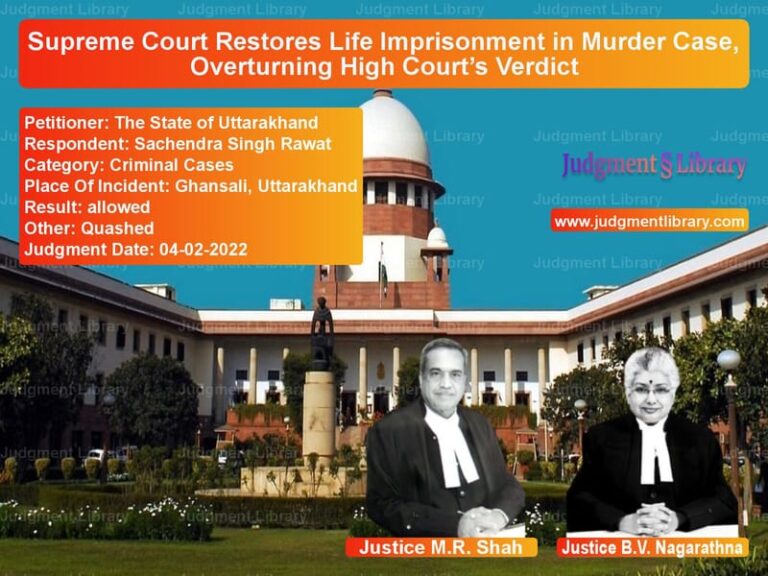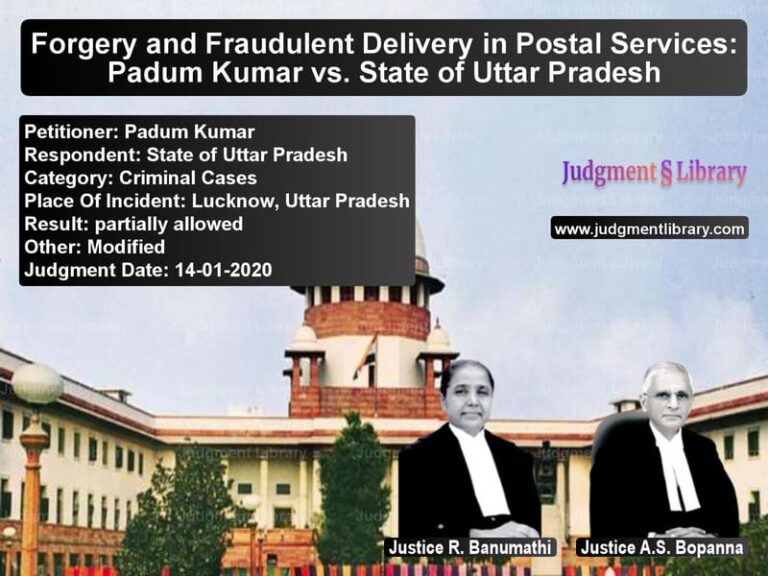Supreme Court Quashes Rape Case: Consensual Relationship Cannot Become Rape When Promise of Marriage Fails
In a significant judgment that clarifies the boundaries between consensual relationships and criminal offenses, the Supreme Court has quashed a rape case against a 25-year-old student, ruling that a consensual physical relationship between two adults cannot be treated as rape merely because the promise of marriage wasn’t fulfilled. The case of Amol Bhagwan Nehul versus The State of Maharashtra brings to light the complex interplay between personal relationships and criminal law, setting an important precedent for similar cases across the country.
The story begins in June 2022 when Amol Nehul, a B.Sc Agriculture student at Krishna College of Agriculture in Karad, Maharashtra, moved into a rental accommodation next door to the complainant, a woman who had separated from her husband and was living with her four-year-old son. What started as a friendly neighborhood acquaintance soon blossomed into a relationship that would eventually lead to serious criminal charges and a legal battle reaching the highest court of the land.
According to the FIR registered on July 31, 2023, the complainant alleged that between July 2022 and July 2023, Amol had forcible sexual intercourse with her on multiple occasions under the false assurance of marriage. She claimed that their first physical encounter occurred in July 2022 when Amol entered her house at night and promised to marry her once she obtained divorce from her husband. The relationship continued with alleged incidents at Rajyog Lounge in September 2022 and Pushkar Lodge in January 2023, where she also accused him of unnatural sex. The complainant stated that Amol borrowed money from her and used her car for personal purposes during their relationship.
The turning point came in July 2023 when the complainant visited Amol’s native village in Ahmednagar to meet his family. His parents refused the marriage proposal citing religious differences, and according to the complainant, his family members pushed and abused her. This incident led to the filing of the FIR 23 days later, alleging offenses under Sections 376 (rape), 376(2)(n) (repeated rape), 377 (unnatural sex), 504 (intentional insult) and 506 (criminal intimidation) of the Indian Penal Code.
The Legal Battle Begins
Amol’s version presented a completely different narrative. He claimed that the complainant had been pursuing him and would regularly visit his college, which even led to grievances being raised with the college faculty. His father filed a written complaint on July 24, 2023, alleging that the complainant had been harassing his son, taking him to different lodges against his will, and threatening to implicate him in false rape cases if he refused to marry her. A Non-Cognizable Offence Report was also registered based on a threatening phone call received on July 22, 2023.
Fearing arrest, Amol approached the Additional Sessions Judge, Karad for anticipatory bail, which was granted on August 23, 2023. The Sessions Judge made crucial observations while granting bail, noting that “the prosecutrix who is major lady gives consent even on any of the aforesaid assumption and she had sexual intercourse with applicant/accused, she will be under all circumstances and in all respect considered to be a consenting party.” The judge further remarked that “when two young male and female having attained the age of discretion get attracted to each other and due to emotional and passionate attachment succumbed to temptation of sexual relationship then such mental and voluntary participation does not come in the way of granting bail.”
Encouraged by the bail order, Amol approached the Bombay High Court under Section 482 of the Criminal Procedure Code seeking quashing of the FIR and subsequent proceedings. However, the High Court dismissed his petition on June 28, 2024, leading to the appeal before the Supreme Court.
Arguments Before the Supreme Court
Amol’s counsel presented compelling arguments before the Supreme Court, contending that “the High Court has erred in dismissing the Petition u/s 482 CrPC insofar as the criminal proceedings in the present case constitute an abuse of process of law, and is well within the categories as contemplated by this Court in State of Haryana Vs Bhajan Lal.”
The counsel argued that “the allegations of forcible sexual assault and unnatural sex are highly improbable as there is no medical evidence to adduce that forcible sexual assault and unnatural sex had been committed upon the Complainant/Respondent no. 2 and that allegations of rape are unsustainable as the relationship between the parties being two mature adults was purely consensual in nature.” He also pointed out that “the captioned FIR is registered after a delay of 13 months from the date of the alleged incident, which is considerable to cast doubt on the veracity of the allegations made by the Complainant/Respondent no. 2, especially when she sustained her relationship with the Appellant since the alleged incident.”
The State of Maharashtra, representing the prosecution, defended the case, arguing that the allegations disclosed prima facie offenses and that the matter should proceed to trial for proper adjudication.
The Supreme Court’s Analysis
The Supreme Court bench comprising Justices B.V. Nagarathna and Satish Chandra Sharma delivered a comprehensive judgment, analyzing the case from multiple angles. The court identified several crucial aspects that undermined the prosecution’s case.
Read also: https://judgmentlibrary.com/supreme-court-corrects-typographical-error-in-criminal-case-judgment/
The judges noted that “even if the allegations in the FIR are taken as a true and correct depiction of circumstances, it does not appear from the record that the consent of the Complainant/Respondent no. 2 was obtained against her will and merely on an assurance to marry.” They observed that “the Appellant and the Complainant/Respondent no. 2 were acquainted since 08.06.2022, and she herself admits that they interacted frequently and fell in love. The Complainant/Respondent no. 2 engaged in a physical relationship alleging that the Appellant had done so without her consent, however she not only sustained her relationship for over 12 months, but continued to visit him in lodges on two separate occasions. The narrative of the Complainant/Respondent no. 2 does not corroborate with her conduct.”
On the crucial issue of consent obtained under misconception of fact, the court held that “the consent of the Complainant/Respondent no. 2 as defined under section 90 IPC also cannot be said to have been obtained under a misconception of fact. There is no material to substantiate ‘inducement or misrepresentation’ on the part of the Appellant to secure consent for sexual relations without having any intention of fulfilling said promise.”
The court made a significant observation about the timing of the complainant’s divorce, noting that “Investigation has also revealed that the Khulanama, was executed on 29.12.2022 which the Complainant/Respondent no. 2 had obtained from her ex-husband. During this time, the parties were already in a relationship and the alleged incident had already taken place. It is inconceivable that the Complainant had engaged in a physical relationship with the Appellant, on the assurance of marriage, while she was already married to someone else. Even otherwise, such promise to begin with was illegal and unenforceable qua the Appellant.”
Regarding the allegations of criminal intimidation, the court found them improbable, stating that “There is no evidence of coercion or threat of injury to the Complainant/Respondent no. 2, to attract an offence under section 506 IPC. It is improbable that there was any threat caused to the Complainant/Respondent no. 2 by the Appellant when all along the relationship was cordial, and it was only when the Appellant graduated and left for his hometown to Ahmednagar, the Complainant/Respondent no. 2 became agitated.”
The court also took note of the complainant’s conduct in visiting Amol’s native village without intimation, observing that this “reflects the agitated and unnerved state of mind of the Complainant/Respondent no. 2. For the same reason, the criminal prosecution against the Appellant herein is probably with an underlying motive and disgruntled state of mind.”
In a particularly significant observation, the court stated that “There is also no reasonable possibility that the Complainant/Respondent no. 2 or any woman being married before and having a child of four years, would continue to be deceived by the Appellant or maintain a prolonged association or physical relationship with an individual who has sexually assaulted and exploited her.”
The Legal Principles Applied
The Supreme Court categorically stated that “this is also not a case where there was a false promise to marry to begin with. A consensual relationship turning sour or partners becoming distant cannot be a ground for invoking criminal machinery of the State. Such conduct not only burdens the Courts, but blots the identity of an individual accused of such a heinous offence.”
The court reiterated its earlier warnings, noting that “This Court has time and again warned against the misuse of the provisions, and has termed it a folly to treat each breach of promise to marry as a false promise and prosecute a person for an offence under section 376 IPC.”
The judgment placed strong reliance on the landmark case of State of Haryana Vs Bhajan Lal, which laid down categories where courts can exercise their inherent powers to quash criminal proceedings to prevent abuse of process of law. The court found that the present case squarely fell under categories 102(5) and 102(7) of the Bhajan Lal case.
Category 102(5) covers cases where “the allegations made in the FIR or complaint are so absurd and inherently improbable on the basis of which no prudent person can ever reach a just conclusion that there is sufficient ground for proceeding against the accused.” Category 102(7) applies where “a criminal proceeding is manifestly attended with mala fide and/or where the proceeding is maliciously instituted with an ulterior motive for wreaking vengeance on the accused and with a view to spite him due to private and personal grudge.”
The Final Verdict and Its Implications
In its concluding remarks, the Supreme Court emphasized the importance of protecting young individuals from unwarranted criminal proceedings, stating that “Taking into consideration that the Appellant is just 25 years of age, and has a lifetime ahead of him, it would be in the interest of justice that he does not suffer an impending trial and, therefore, the proceedings emanating from C.R. No. 490/2023 dt. 31.07.2023 are quashed at this stage itself.”
The court consequently allowed the appeal and set aside the High Court’s order. It quashed C.R. No. 490/2023 registered at Karad Taluka Police Station, Satara and all proceedings emanating from it, discharging Amol from the case and cancelling his bail bonds.
This judgment serves as an important reminder that criminal law should not be used as a tool to settle scores in failed relationships. The Supreme Court has drawn a clear line between genuine cases of rape and consensual relationships where parties later develop differences. The court’s emphasis on examining the conduct of the parties, the timing of the complaint, and the inherent probabilities of the case provides valuable guidance for lower courts dealing with similar allegations.
The judgment also highlights the need for courts to exercise their inherent powers under Section 482 of CrPC to prevent abuse of the legal process, particularly in cases where criminal proceedings appear to be motivated by personal vendetta rather than genuine criminal intent. For Amol Nehul and many others facing similar situations, this verdict brings much-needed clarity and protection against the misuse of rape laws in consensual relationships that eventually turn sour.
Petitioner Name: Amol Bhagwan Nehul.Respondent Name: The State of Maharashtra & Anr.Judgment By: Justice B.V. Nagarathna, Justice Satish Chandra Sharma.Place Of Incident: Karad, Satara, Maharashtra.Judgment Date: 26-05-2025.Result: allowed.
Don’t miss out on the full details! Download the complete judgment in PDF format below and gain valuable insights instantly!
Download Judgment: amol-bhagwan-nehul-vs-the-state-of-maharas-supreme-court-of-india-judgment-dated-26-05-2025.pdf
Directly Download Judgment: Directly download this Judgment
See all petitions in Rape Cases
See all petitions in Bail and Anticipatory Bail
See all petitions in Judgment by B.V. Nagarathna
See all petitions in Judgment by Satish Chandra Sharma
See all petitions in allowed
See all petitions in Quashed
See all petitions in supreme court of India judgments May 2025
See all petitions in 2025 judgments
See all posts in Criminal Cases Category
See all allowed petitions in Criminal Cases Category
See all Dismissed petitions in Criminal Cases Category
See all partially allowed petitions in Criminal Cases Category







